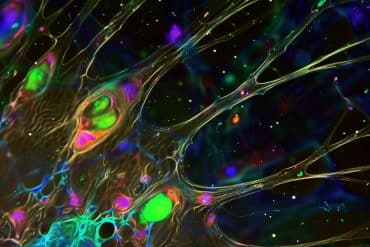Summary: Drinking more than six cups of coffee per day is associated with an increased risk of cardiovascular disease.
Source: University of South Australia
Latte, cappuccino or short black, a morning coffee is an essential for many people looking to kick start their day. But while the humble coffee may be a vital feature of the daily grind, how much is too much?.
While the pros and cons of drinking coffee have been debated for decades, new research from the University of South Australia reveals that drinking six or more coffees a day can be detrimental to your health, increasing your risk of heart disease by up to 22 per cent.
In Australia, one in six people are affected by cardiovascular disease. It is a major cause of death with one person dying from the disease every 12 minutes. According to the World Health Organization, cardiovascular disease is the leading cause of death, yet one of the most preventable.
Investigating the association of long-term coffee consumption and cardiovascular disease, UniSA researchers Dr Ang Zhou and Professor Elina Hyppönen of the Australian Centre for Precision Health say their research confirms the point at which excess caffeine can cause high blood pressure, a precursor to heart disease.
This is the first time an upper limit has been placed on safe coffee consumption and cardiovascular health.
“Coffee is the most commonly consumed stimulant in the world – it wakes us up, boosts our energy and helps us focus – but people are always asking ‘How much caffeine is too much?’,” Prof Hyppönen says.

“Most people would agree that if you drink a lot of coffee, you might feel jittery, irritable or perhaps even nauseous – that’s because caffeine helps your body work faster and harder, but it is also likely to suggest that you may have reached your limit for the time being.
“We also know that risk of cardiovascular disease increases with high blood pressure, a known consequence of excess caffeine consumption.
“In order to maintain a healthy heart and a healthy blood pressure, people must limit their coffees to fewer than six cups a day – based on our data six was the tipping point where caffeine started to negatively affect cardiovascular risk.”
Using UK Biobank data of 347,077 participants aged 37-73 years, the study explored the ability of the caffeine-metabolizing gene (CYP1A2) to better process caffeine, identifying increased risks of cardiovascular disease in line with coffee consumption and genetic variations.
Prof Hyppönen says that despite carriers of the fast-processing gene variation being four times quicker at metabolising caffeine, the research does not support the belief that these people could safely consume more caffeine, more frequently, without detrimental health effects.
“An estimated three billion cups of coffee are enjoyed every day around the world,” Prof Hyppönen says.
“Knowing the limits of what’s good for you and what’s not is imperative. As with many things, it’s all about moderation; overindulge and your health will pay for it.”
Source:
University of South Australia
Media Contacts:
Annabel Mansfield – University of South Australia
Image Source:
The image is adapted from the Cedars-Sinai news release.
Original Research: Closed access
“Long-term coffee consumption, caffeine metabolism genetics, and risk of cardiovascular disease: a prospective analysis of up to 347,077 individuals and 8368 cases”. Ang Zhou and Elina Hyppönen.
American Journal of Clinical Nutrition. doi:10.1093/ajcn/nqy297
Abstract
Long-term coffee consumption, caffeine metabolism genetics, and risk of cardiovascular disease: a prospective analysis of up to 347,077 individuals and 8368 cases
Background
Coffee is one of the most widely consumed stimulants worldwide and is generally considered to be safe or even beneficial for health. However, increased risk of myocardial infarction and hypertension has been suggested for individuals who carry a functional variant at cytochrome P450 1A2 (CYP1A2), which makes them less effective at metabolizing caffeine.
Objectives
The aim of this study was to examine if the CYP1A2 genotype or a genetic score for caffeine metabolism (caffeine-GS) modifies the association between habitual coffee consumption and the risk of cardiovascular disease (CVD).
Methods
Genetic data and information on habitual coffee intake and relevant covariates were available for 347,077 individuals in the UK Biobank, including 8368 incident CVD cases. We used logistic regression to test for the association between coffee intake and CVD risk, and whether the association varies with CYP1A2 genotype or caffeine-GS.
Results
The association between habitual coffee intake and CVD risk was nonlinear, and, compared with participants drinking 1–2 cups/day, the risk of CVD was elevated for nondrinkers, drinkers of decaffeinated coffee, and those who reported drinking >6 cups/day (increase in odds by 11%, 7%, and 22%, respectively, P-curvature = 0.013). CYP1A2 genotype and caffeine-GS were not associated with CVD (P ≥ 0.22 for all comparisons). There was no evidence for an interaction between the CYP1A2 genotype or caffeine-GS and coffee intake with respect to risk of CVD (P ≥ 0.53).
Conclusions
Heavy coffee consumption was associated with a modest increase in CVD risk, but this association was unaffected by genetic variants influencing caffeine metabolism.






